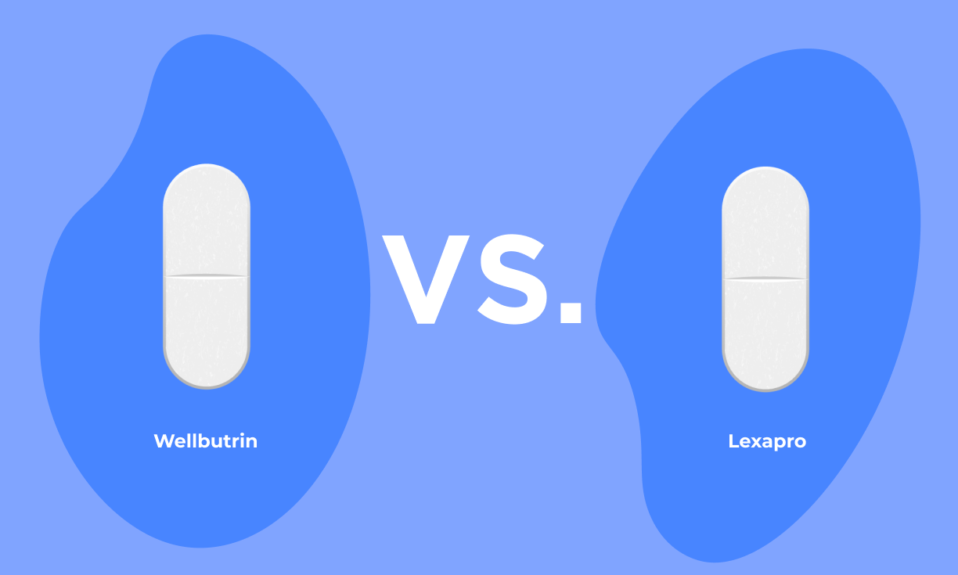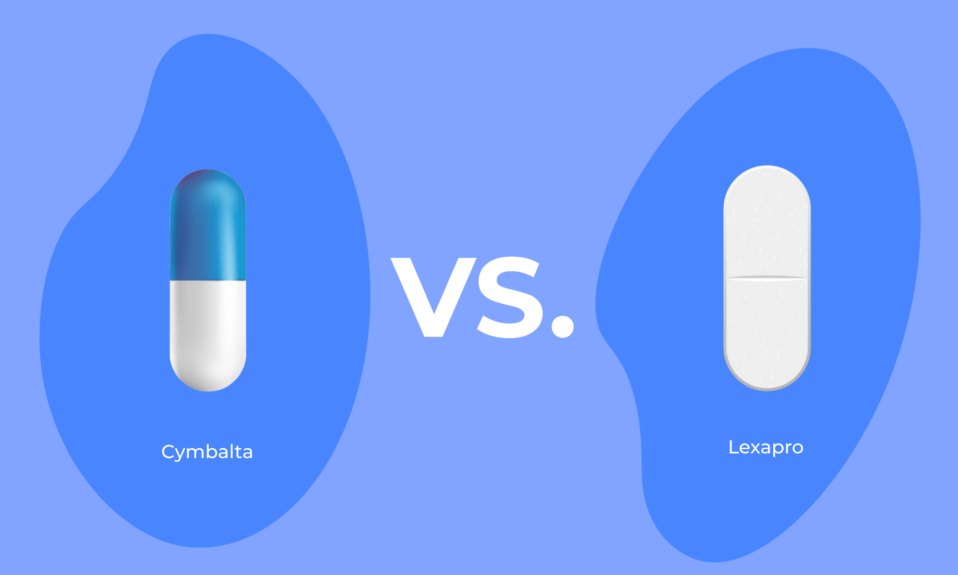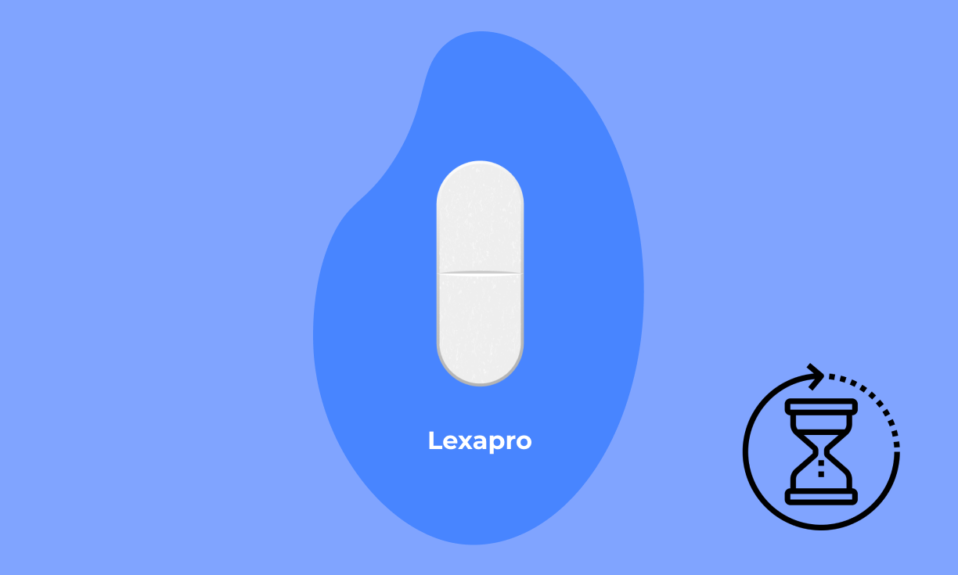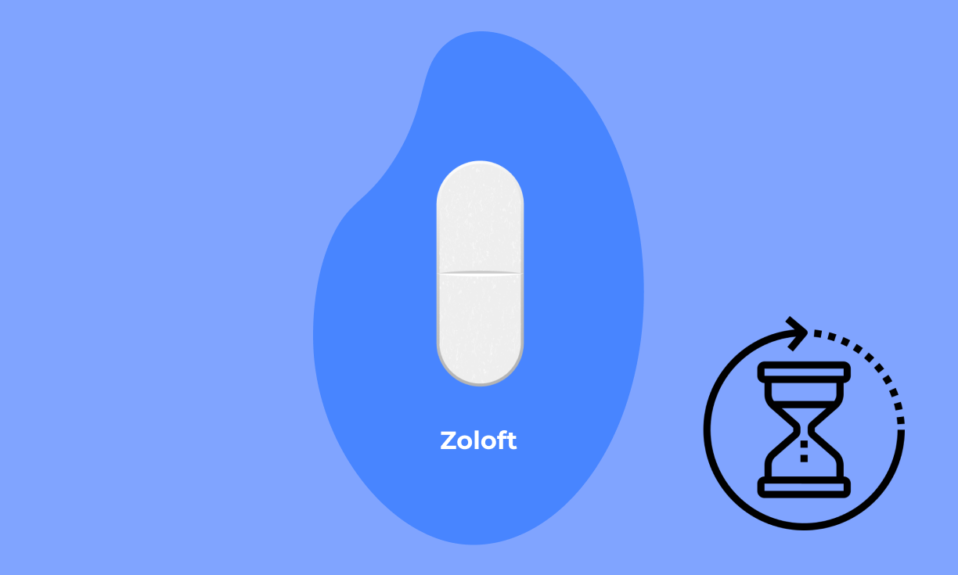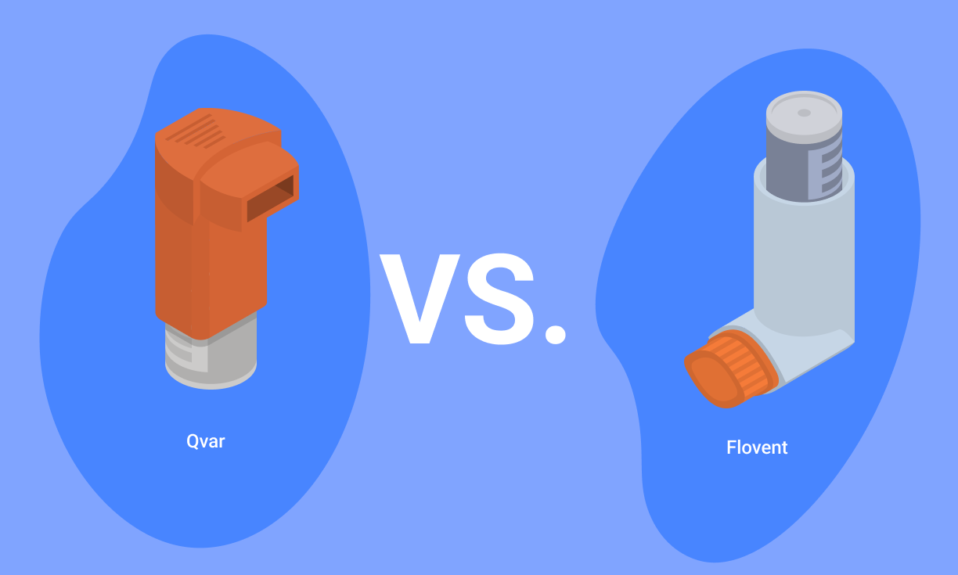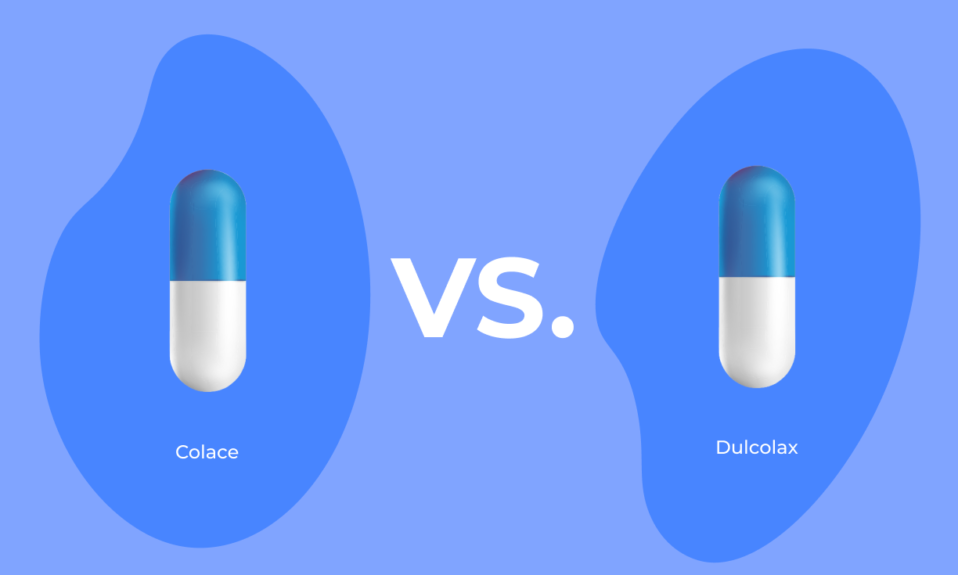Table of Contents Hide
- Differences
- Interactions
- Side Effects
- Conclusion
- FAQs
- How are Wellbutrin and Lexapro different?
- Which has fewer side effects, Lexapro or Wellbutrin?
- Can Wellbutrin and Lexapro be taken together?
- Does Lexapro cause weight gain?
- Does Wellbutrin cause weight gain?
- How long does it take for Lexapro to work? How long does it take for Wellbutrin to work?
- Does Lexapro make you tired?
- How does Lexapro make you feel the first week?
- Can I use Wellbutrin or Lexapro while pregnant?
- Can I use Wellbutrin or Lexapro with alcohol?
- Can Wellbutrin help with anxiety?
- Can Lexapro help with anxiety?
- References
Various antidepressants can be used to treat depression in patients. Among these drugs, Wellbutrin (Bupropion) and Lexapro (Escitalopram) are commonly used. They work by different mechanisms and have a broad spectrum of indications. This blog explores their differences, drug-drug interactions, and side effects.
Major Depressive Disorder (MDD) is one of the most prevalent psychological conditions. Feelings of sadness and hopelessness characterize MDD, inability to experience pleasure in usual activities, changes in sleep patterns and appetite, loss of energy, and suicidal thoughts. An estimated 21.0 million adults in the United States had at least one major depressive episode.
Over the years, many treatments, including medications, have been introduced to deal with this crippling disorder. While many people take therapy, stick to a routine, and indulge in physical activity or meditation to deal with the symptoms of depression, it doesn’t always work for everyone. A large number of people may be prescribed medications to mitigate symptoms of depression. Lexapro and Wellbutrin are among these widely-used medications.
In this article, we will talk about the differences between these two drugs, their interactions, and the side effects they have.
Differences
Lexapro and Wellbutrin share many similarities, particularly in their therapeutic uses. However, many differences in their drug class and mechanism of action set them apart.
Class of Drug
Lexapro belongs to the class Selective Serotonin Reuptake Inhibitor (SSRIs), a group of antidepressant drugs that specifically inhibit serotonin reuptake, having 300 to 3000 fold greater selectivity for the serotonin transporter as compared to the norepinephrine transporter.
Wellbutrin belongs to the atypical antidepressants and is a weak dopamine and norepinephrine reuptake inhibitor instead of Lexapro, which is a serotonin inhibitor.
Generic Name
The generic name of Lexapro is Escitalopram, and the generic name of Wellbutrin is Bupropion.
Mechanism of Action
Lexapro works by blocking the reuptake of serotonin, leading to increased concentrations of the neurotransmitter in the synaptic cleft. SSRIs typically take at least two weeks to produce significant improvement in mood, and maximum benefit may require up to 12 weeks or more.
Wellbutrin functions by inhibiting the reuptake of dopamine and norepinephrine.
Therapeutic Uses
The primary indication for Lexapro is depression. Several other psychiatric disorders also respond favorably to Lexapro, including Obsessive-Compulsive Disorder (OCD), panic disorder, Generalized Anxiety Disorder (GAD), posttraumatic stress disorder (PTSD), social anxiety disorder, and premenstrual dysphoric disorder.
Wellbutrin is used to alleviate the symptoms of depression; it is also helpful in decreasing cravings and attenuating withdrawal symptoms of nicotine in patients trying to quit smoking.
Drug Forms
Lexapro is available as an oral tablet in strengths of 5 mg, 10 mg, and 20 mg.
Wellbutrin is available in 3 different forms: immediate-release (IR), sustained-release (SR), and extended-release (XL).
Dosage
These drugs differ in dosage per day. The recommended dose of Lexapro is 10 mg once daily.
The recommended starting dose of Wellbutrin is 200 mg/day, given as 100 mg twice daily. After 3 days of dosing, the dose may be increased to 300 mg/day, given as 100 mg 3 times daily, with at least 6 hours between successive doses.
Which One is Better?
Many researchers have strived to compare the efficacy of both these drugs in treating depression. According to studies, both Wellbutrin and Lexapro show a similar effect in treating depression. However, Wellbutrin is significantly less likely to cause adverse sexual side effects than Lexapro.
A study suggests that using Lexapro and Wellbutrin together in patients with MDD as a dual therapy can increase the responses and symptom remission rates.
Interactions
Lexapro is a potent substrate of enzymes CYP2C19 and CYP3A4 and a weak inhibitor of CYP2D6. A detailed discussion of these enzymes and the effects of drugs on these enzymes is outside the scope of this article.
Commonly, SSRIs have the potential to cause serotonin syndrome (Serotonin syndrome is when your body has too much of a chemical called serotonin, usually because of a medication or combination of medications), primarily when used in the presence of an MAOI (Monoamine oxidase inhibitors) such as rasagiline, selegiline, isocarboxazid, phenelzine or other highly serotonergic drugs. A serotonergic drug is a drug pertaining to or affecting serotonin.
SSRIs’ use with TCAs (tricyclic antidepressants) such as imipramine, amitriptyline, and doxepin is also generally not suggested to avoid QT prolongation (a heart rhythm disorder that can potentially cause fast, chaotic heartbeats) and serotonin syndrome. Other drugs with which Lexapro shows interactions include:
- Triptans
- Dexmethylphenidate, Methylphenidate – amphetamines
- 5HT3 antagonists (anti-emetic agents)
- Apixaban, Edoxaban – antiplatelets
- Aspirin, Diclofenac – NSAIDs
- Heparin – anticoagulants
- Dopamine-norepinephrine uptake inhibitors
- Anxiolytic
- Chemotherapy agents
- Proton Pump Inhibitors (PPIs)
- Fluconazole – antifungal
- Hydroxychloroquine – antimalarial
Wellbutrin is metabolized by the CYP2B6 pathway and has a low risk for drug-drug interactions, given the few agents that inhibit/induce this enzyme. It is a potent inhibitor of CYP2D6, so it is essential to decrease the dose of Wellbutrin if you are coadministering it with CYP2D6 substrates such as antidepressants, antipsychotics, antiarrhythmics, beta-blockers, opioid analgesics, anticancer agents, and assorted other drugs.
Some famous examples include:
- Fluoxetine
- Sertraline
- Haloperidol
- Risperidone
- Metoprolol
- Atomoxetine
- Carbamazepine
- Tramadol
- TCAs
- Aripiprazole
Side Effects
Lexapro has a wide range of side effects such as headache, sweating, anxiety, agitation, hyponatremia, gastrointestinal (GI) effects (nausea, vomiting, diarrhea), weakness and fatigue, sexual dysfunction, changes in weight, sleep disturbances (insomnia and drowsiness), and various drug-drug interactions.
1) Sleep Disturbances
Lexapro has more sedating than activating effects, and it may be helpful in patients who have trouble sleeping. It may cause sleep disturbances in people with standard sleep patterns and drowsiness.
2) Sexual Dysfunction
It can result in sexual dysfunction, including loss of libido, delayed ejaculation, and anorgasmia.
3) Suicidal Ideation
Lexapro should be used cautiously in children and teenagers because there have been several reports of suicidal ideation in this age group. Children and teenagers should be monitored for worsening depression and suicidal thinking with initiation or dosage change of any antidepressant. While Lexapro is particularly approved to treat childhood depression, it is still necessary to monitor and report any changes associated with the use of this drug.
4) Overdose
Uncontrolled use of Lexapro in patients may lower the threshold for seizures and increase their possibility. The drug also can cause serotonin syndrome, especially if it is co-administered with an MAOI or other highly serotonergic drug. Serotonin syndrome is characterized by hyperthermia, muscle rigidity, sweating, myoclonus (clonic muscle twitching), and changes in mental status and vital signs.
5) Discontinuation Syndrome
Abrupt withdrawal of Lexapro can result in discontinuation syndrome. The signs and symptoms of this syndrome include headache, malaise, flu-like symptoms, agitation, irritability, nervousness, and changes in sleep patterns.
On the other hand, the side effects of Wellbutrin may include:
- Dry mouth
- Sweating
- Nervousness
- Tremor
- Dose-dependent increased risk for seizures
- Nausea
- Vomiting
- Diarrhea
- Headache
Counseling the patient when initiating or making any changes in their antidepressant therapy is central to their compliance. Many people discontinue using Lexapro due to its unpleasant sexual effects. Since Wellbutrin shows no evidence of decreased libido or sexual dysfunction, patients are more willing to use it.
Conclusion
Depression is highly treatable using various drugs, Wellbutrin and Lexapro are two such drugs that treat depression. However, the various antidepressants have their pros and cons in terms of efficacy, side effects, drug interactions, etc. The drug you are prescribed depends on what suits your body and that can vary from person to person. So, it is important to talk to your doctor about your condition and follow their diagnosis and treatment plan.
FAQs
How are Wellbutrin and Lexapro different?
Wellbutrin is an atypical antidepressant, while Lexapro belongs to the SSRI group of drugs. Another significant difference is that Wellbutrin works by inhibiting the reuptake of dopamine and norepinephrine, while Lexapro works by inhibiting the reuptake of Serotonin.
Which has fewer side effects, Lexapro or Wellbutrin?
Wellbutrin may have fewer side effects, specifically related to libido, and therefore may be the better choice for some patients. However, Lexapro has fewer drugs interactions than Wellbutrin.
Can Wellbutrin and Lexapro be taken together?
Yes. You can take Wellbutrin and Lexapro together. Studies suggest that taking these medications together can be beneficial and may improve symptoms in depressed patients. But only your doctor can prescribe the right treatment plan.
Does Lexapro cause weight gain?
Yes, a person may gain some weight when taking Lexapro. This can happen for different reasons. Lexapro boosts serotonin, which plays a role in controlling weight. The medication may increase appetite directly, or a person may begin to eat more as their depression or anxiety lessens.
Does Wellbutrin cause weight gain?
Generally No. Wellbutrin is more likely to cause weight loss, which is very common. Wellbutrin weight gain is possible but is very rare to occur.
How long does it take for Lexapro to work? How long does it take for Wellbutrin to work?
Lexapro: Most people report feeling the effects of their Lexapro within 4 weeks. It can take some people as little as a day or as long as 6 weeks to feel the effects of their treatment.
Wellbutrin: Sleep, energy, or appetite may show some improvement within the first 1-2 weeks with Wellbutrin. Improvement in these physical symptoms can be an important early signal that the medication is working. Depressed mood and lack of interest in activities may need up to 6-8 weeks to fully improve.
Does Lexapro make you tired?
Yes. You may feel restless, fatigued, or have trouble sleeping (insomnia), which can cause further tiredness. These will often improve over the first week or two as you continue to take the medication.
How does Lexapro make you feel the first week?
You may feel the following during the first week: Headache, nausea, diarrhea, dry mouth, increased sweating, feeling nervous, restless, fatigued, or having trouble sleeping (insomnia). These will often improve over the first week or two as you continue to take the medication.
Can I use Wellbutrin or Lexapro while pregnant?
Wellbutrin is categorized by the FDA as generally safe during pregnancy. That said, Bupropion (Wellbutrin) and the chemicals from its metabolism do cross the human placenta.
There have not been adequate human studies to determine the efficacy of Lexapro in pregnant women. And like Wellbutrin, Lexapro has been determined to cross the human placenta.
Therefore, it is very important to talk to your doctor and follow their medical advice to determine the use of Wellbutrin or Lexapro in pregnancy.
Can I use Wellbutrin or Lexapro with alcohol?
Patients are advised to avoid alcohol if taking Wellbutrin or Lexapro as alcohol can increase the toxic effects of both Wellbutrin and Lexapro.
Can Wellbutrin help with anxiety?
Wellbutrin is not usually prescribed in the treatment of anxiety, and in fact, for many patients, anxiety may worsen while on Wellbutrin. Please talk to your doctor or healthcare professional to determine the best treatment plan for anxiety.
Can Lexapro help with anxiety?
Yes, Lexapro is prescribed for moderate to severe generalized anxiety disorder (GAD) and moderate to severe social anxiety disorder (SAD/social phobia). GAD is excessive and uncontrolled worry about a number of events on most days for at least 6 months.
References
https://www.drugs.com/compare/bupropion-vs-lexapro
https://www.medicinenet.com/lexapro_vs_wellbutrin/article.htm
https://www.rxlist.com/lexapro_vs_wellbutrin/drugs-condition.htm


